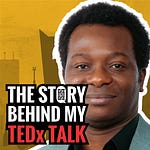Please forward this to ONE friend today and tell them to subscribe here.In this episode, I’m speaking with Yauhan Mehta, a career coach who’s helped 750+ immigrants land jobs they love at global companies.
A major part of Yauhan’s success is an interesting approach he takes to career coaching. He never starts coaching with resume work. Instead, he begins with a soul-searching session to identify what people want.
Then, if they have the financial means, they can focus on getting their target role. If they don’t have savings, they get something quickly that’s still somewhat related to their profession or has transferable skills.
1 like that. Because more often than not, immigrants take jobs that are not in sync with who they are or their skillset, and then continue doing that for many years.
Yauhan and I also chat about:
His journey from India to Dubai to Canada
How he dropped out of engineering and ended up as a career coach
Why he’s passionate about helping fellow immigrants get their best jobs
How long it took him to settle somewhat into Canada
Dozie’s Notes
A few things that stuck with me as I listened through this week’s conversation:
There are the right kind of “survival jobs.” When people need immediate income, Yauhan helps them identify the three most common skills required for their target role, then get a job that builds those skills. If someone wants to focus on training and development, they can work as a shift supervisor or team lead at Tim Hortons or McDonald’s, where they’ll be mentoring, coaching, training, hiring, and onboarding people. That’s different from taking a telemarketing or sales job where the transferable skills aren’t as obvious.
Finding career clarity can save you from years of regret. Yauhan has seen people whose background was finance or HR or marketing take customer service jobs because they’re easy to get. They continue doing that for many, many years. Then someday, they realize they’ve spent so many years working in a career that’s completely out of sync with what they did back home or their interests or their education. At that point, it can be really difficult to find your way back.
Communication struggles go beyond speaking English. Yauhan points out that communication involves context and culture. Where he comes from, there’s a lot of hierarchy and respect for elders and people in higher positions. You would never think about questioning anybody who’s even a day older than you or in a higher position. But in Canada, you need to be able to question things, share your thoughts, have debates or conversations with anybody, even if they are in a higher position.
Official Links
✅ Connect with Yauhan Mehta on LinkedIn
✅ Book a free 15 minutes discovery call
One Ask
If you found this story helpful, please forward or share it to one immigrant out there.













